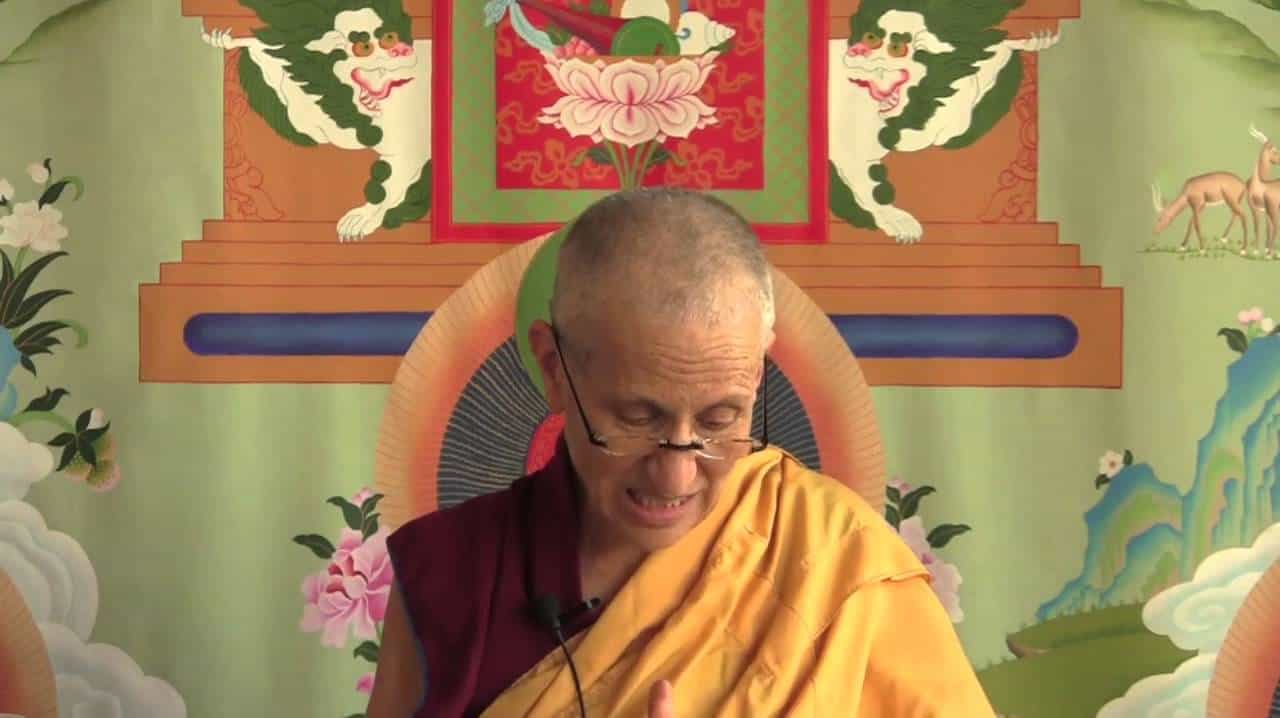Verse 12: Attachment to comfort
Part of a series of talks on Gems of Wisdom, a poem by the Seventh Dalai Lama.
- Our attachment to comfort actually brings us suffering
- Our need for comfort can inspire ludicrous demands on others
Gems of Wisdom: Verse 12 (download)
“Who’s the drunken fool always bringing suffering unto himself?”
None of us, huh?
“The one who spends his time lusting after comfort, pleasure, wealth, and fame.”
Shall we go on to the next verse? [laughter] Let’s just cross this one off, huh?
Who’s the drunken fool always bringing suffering unto himself?
The one who spends his time lusting after comfort, pleasure, wealth, and fame.
In other words, the eight worldly concerns.
Let’s just take it here: “Lusting after comfort.” How does lusting after comfort bring suffering to us?
Audience: When we don’t get what we want, there’s suffering
Venerable Thubten Chodron (VTC): Yes, when we don’t get it, it’s suffering. And even if we do get it, we worry about losing it. Or we get tired of it, and we want something else. We’re dissatisfied.
How do we lust after comfort? What are you lusting after? Lusting is a good word here. It doesn’t mean sexual lust, it means that mind that is fixated on, “I’ve got to be comfortable.” [Examples] “This room is too hot. Open the windows. I don’t care if the rest of you are freezing. Open the windows.” “This room is too cold. Close the windows. I don’t care if the rest of you are stuffy. We’ve got to close the windows.” “My bed is too soft. My bed is too hard. The food is too hot. The food is not hot enough.”
What else “comfort?” The car. “This car is bumpy.” “This car smells like mice pee.” That’s our car. Because the mice nest in the engine. So then when you open the vents inside the car…. The car smells like mice pee.
Other things of being comfortable…. Temperature. Hunger. Physical sensations. The tea’s not hot enough, sweet enough, strong enough.
I was really intrigued that at a community meeting we had this week when Venerable Chonyi was saying that in Gotami when she hears people walk around in the morning and stuff like that she feels really good because it reminds her she has a lot of friends and we’re all doing the same thing together. Venerable Jigme was saying something like that to me yesterday when we were in the car, that when she’s in Ananda and different people are doing different things and you can hear them she feels really good, it’s like, “I have lots of friends, we’re all working in the same direction.” So, if that were inherently existent comfort, if that comfort were inherently existent and the cause of that comfort were inherently existent, then everybody would find that situation pleasurable. But other people don’t. Some people go crazy: “I hear your footsteps. I can’t sleep. We need to put a….” What do you call it? Like a rope with a wheel on the top? And you grab it at one end of the corridor and you take it into the bathroom. “And then I won’t hear your footsteps, because your footsteps bother me.”
Audience: A pulley
VTC: Yes, a pulley. “So you just get a pulley and that’s how you go down the corridor. Because your footsteps wake me up.”
Or like Tarzan. We’ll bring in some of the vines from the forest. They’re really strong, by the way. We’ll bring some of those in and you can just swing down the corridor and your footsteps won’t…. Then we’ll put foam against the wall so it doesn’t make any sound. [laughter]
So, for one person, the noise just drives them crazy. Same thing in Ananda. It’s like, “Why are all these people here in this building, working? They’re disturbing me. We should all have our own individual buildings where we work and then nothing will disturb me.”
Some time ago Venerable Yeshe was feeling like, “Oh, really, I can’t stand to be around people, I need some space.” It was a day when we all went out, somebody invited us for lunch and she didn’t want to come because she said, “I just can’t stand being around all of you, you’re driving me crazy.” So we went out, we had a good time, and we came back and she said, “You were all gone, and I was still unhappy.”
All this just shows that all these things, when we think our unhappiness is due to an external situation, our discomfort is due to an external situation, if things inherently existed as we’re perceiving them at that time and as we’re believing them to be at that time, then everybody should find that same situation uncomfortable. And everybody should find the absence of that situation pleasurable. But some people find that situation comfortable, some don’t. Some find its absence nice, some don’t. So it’s just showing that things are not truly existent out there. But when we grasp them to be truly existent, and we say, “This is impinging on my comfort,” then we are “the drunken fool who always brings suffering unto himself.” Aren’t we? Because it’s our mind telling us that this is a bad situation. Unendurable situation. Cannot stand it situation.
I was thinking, because they just released this one prisoner who was in Afghanistan, he was imprisoned for five years. And there were no other American prisoners, or NATO prisoners, there. He was all alone. And I was thinking…. You’re sitting there and, what are you going to do? Say, “This situation is absolutely unendurable, unacceptable.” When you have no choice about it? You’re imprisoned by the Taliban. What are you going to do? Go to the Taliban lieutenant and say, “I’m sorry, this situation is not acceptable. I want a soft bed. I want an iPod. And an iPad. And I want a telephone to call my family. What you’re doing is just unacceptable. Sorry.” You do that? Even in American prison. Try doing that in an American prison. They’ll throw you in solitary, which is even worse. So you can see that the more we get attached to things and then get bent out of shape—especially comfort—then the more unhappy our mind is going to be.
When you’re practicing the Dharma it can be a very helpful practice when things aren’t going the way you want. For example, the food is too bland. “She didn’t put enough salt in it.” Or my problem is, “She put too much salt in it.” And then you just say, “This is part of my practice.” “This room is too cold. This is part of my practice.” “The room is too hot. This is part of my practice.” And see if we can train our mind to be okay in those situations.
What I find quite interesting is when I say to myself, “This is too uncomfortable, unbearable, I can’t stand it.” Then I get just completely tense and irate. But as soon as my attention shifts to something else, then I forget all about it. You know? And I might be sitting in my room and I’m still sweating, because it’s so hot. Or still shivering because it’s so cold. But I’ve forgotten about it because my concentration is on something else. But as soon as I go back to, “It’s too hot,” or “It’s too cold,” then my mind just goes totally berserky and I can’t think about anything else.
It always reminds me of how parents, when they have a crying baby, what do they do? It’s very skillful. You take a crying baby…. If you’re indoors, you take them outdoors, or you take them into a different room. You change what they’re perceiving and it distracts them often from what they were crying about. And you know, the same thing works for us adult babies. Except, sometimes we have a harder time shifting our concentration. But it’s interesting how that sometimes works.
I know sometimes I might be asleep and then I get woken up by a sound and I say to myself, “I am too tired to care about this sound.” And then I go right back to sleep. Because I’m so tired. Who has the energy to care about this sound? But if I wake up and it’s like, “Why are they making that noise?” Or, “Why is this light shining in my room?” “Why is it thundering right now?” You know, like when we have the thunderstorms in the middle of the night. “I’m just too tired to care about them.” And I got back to sleep. Otherwise you lose a whole night’s sleep because you’re mad at the thunder.
Okay, we’re going to stay on this verse more than one session. It’s a really interesting thing to think about. I don’t know if you remember, but some time ago we were reading something and they were saying that people have certain things that they’re really fixed on. Some people their main thing is comfort. Some people it is winning. Some people it is being right. And some people it’s being loved and appreciated. And so seeing those four things as things that we get really stuck on, where our attachment goes. So it’s interesting. We all have all four, but to see which one is the primary one for us, where we get really stuck.
“Ah, they don’t appreciate me enough.” *sniff*
“How dare you say I’m wrong! I’m always right!”
“I’ve got to win, no matter what, I’ve got to come out on top!”
Very interesting to see how we get attached to these things and then how that becomes, “The drunken fool bringing suffering unto himself.” And a drunken fool is a very good example. Because when you drink, you drink because you think you’re going to be happy. What happens?
I got drunk one time in my life. That was it. I wanted to see what it was like. That cured me. Finished. No more. Too much suffering.
But even you get drunk multiple times, what does that do to your life? Completely disintegrates your life. “The drunken fool bringing suffering unto himself.”
So, the fault of the afflictions.
Venerable Thubten Chodron
Venerable Chodron emphasizes the practical application of Buddha’s teachings in our daily lives and is especially skilled at explaining them in ways easily understood and practiced by Westerners. She is well known for her warm, humorous, and lucid teachings. She was ordained as a Buddhist nun in 1977 by Kyabje Ling Rinpoche in Dharamsala, India, and in 1986 she received bhikshuni (full) ordination in Taiwan. Read her full bio.


